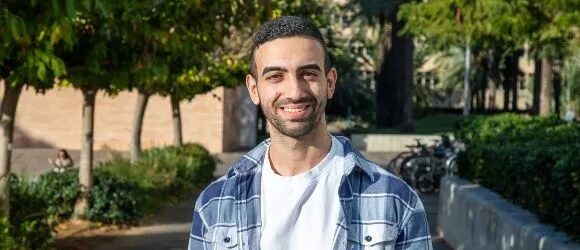TAU’s Periphery Program for Outstanding Students ensures that high-achieving students from all backgrounds can study at Israel’s most influential university
For students from Israel’s periphery—disadvantaged communities and cities which are often far from the country’s geographic center—academic education at a leading university can be difficult to access. For 20 years, Tel Aviv University’s Periphery Program for Outstanding Students has helped those with fewer resources be accepted into its ranks. Many periphery students, once at TAU, go on to become high achievers who continue to successful careers both in and out of academia.
The Periphery Program is generously supported by numerous donors and funds from around the world, including: the Galperin Family; Kadima Scholarships supported by the Kadar Family; Ruth and Amos Wilnai, the Drs. Garry and Kathy Fields-Rayant Scholarship Fund in honor of Dr. Anita Friedman; Prof. Stephen Quake; and The Charles, Evelyn and Sandra Dolansky Foundation through Executive Director Jeff Katz.
WATCH: Shimron, a recent graduate of the Periphery Program, is now a lawyer at a top Israeli law firm.
A Boost to Begin
The Periphery Program admits about 60 students per year through its special admissions track, designed for underprivileged applicants who excelled within their local educational setting. Each student receives a scholarship for the entirety of their undergraduate studies to support their tuition and living costs.
“The scholarship really helps me. I live alone and completely provide for myself: food, transportation, clothes, a social life—the support makes this much easier, I don’t have to fit so many work hours into my already-intense study schedule,” says Hila, 24. Hila, who made aliyah on her own in high school from Russia, is in her final year of a communications BA at TAU’s Coller School of Management.
“I worked very hard in high school, both to be academically successful and to assimilate into my Israeli surroundings as well as to learn Hebrew. Receiving the letter of eligibility from the Periphery Program showed me that my hard work paid off.”
Hila discovered a passion for marketing during her TAU studies, made possible by the Periphery Program. (Photo: Rafael Ben-Menashe)
After serving as a lone soldier in the army, Hila enrolled in Tel Aviv University through the Program. In her first year, she and her fellow Periphery students were provided with workshops, lectures and group activities which helped them navigate the University and manage their time in a new environment. Academic services continue to be available throughout their degrees, as does counseling from Program staff.
A TAU-Led Nationwide Mission
Today, most universities in Israel have similar programs for periphery students, but none would exist without the efforts of Tel Aviv University’s own President Prof. Ariel Porat. While serving as dean of the Buchmann Faculty of Law, Prof. Porat noticed that the academic entrance exam created a much higher barrier for students from disadvantaged backgrounds. Originally, his goal was to help top high school graduates access higher education based on their grades relative to their classmates, rather than their standardized test scores.
The program was so successful that it soon expanded to the rest of the University and the package of services grew. It was later picked up by the Israeli Department of Education, who are able to anonymously identify the most promising students at periphery high schools and inform them of their eligibility to apply for the Program.
Tal, a Periphery Program participant, loves his geophysics studies as well as his fellow students and professors. (Photo: Rafael Ben-Menashe)
“As a kid, studying in Tel Aviv was my dream,” says Tal, 24, a Geophysics (Exact Sciences), third-year student from Bat Yam. “When I got the letter from the Department of Education, I was so happy about the opportunity.”
He loves his professors and fellow students, and feels very much a part of the scientific community as well as part of the University. “The Program has helped me get out of my academic comfort zone and see and meet people from across campus. It has allowed me to focus on my demanding studies without need to work on the side. I also feel much more confident knowing there’s someone I can reach out to when I need some extra help.”
Fostering Success during Wartime
At the Gaza war has worn on, it has affected students in many different ways; many students had to serve as reserve soldiers, others are struggling with trauma and still others had their homes damaged by missiles. Throughout this time, the Periphery Program has done everything it can to be available and accommodating to its participants.
“I feel that I’m supported from every direction at TAU,” says Yakir, 25. “When I was in reserve duty as a Krav Maga instructor for a combat unit, I received financial help. And when I need academic or any other support, there is always someone for me to turn to.” Yakir is from Or Akiva in Israel’s north, a region which was ravaged by rocket fire and is still struggling to recover.
Though his parents never graduated high school, both Yakir and his sister are now studying to become engineers. “The fact that the Program allowed me to start my studies based on my high school performance helped me start sooner and relieved my admissions anxiety; the tuition aid allows me to really focus without getting bogged down by financial worries,” he says. “This was a golden opportunity for which I’m deeply grateful. I would have found a way to do a degree without it, but it would have been an uphill battle.”
Each student is optimistic about the future. Hila has already found work in her field at an international marketing agency, and is very excited to go full-time there when she graduates. Tal hopes to continue in academia to an MA in Environmental Studies, and eventually to go into a career in environmental protection.
